The Day the World Ended
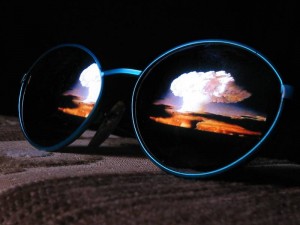 In the summer of 1972, my two sisters and I were three wily adolescent girls, all on the brink of trouble. So our father, Eugene Porter, dragged us camping to the most remote spot that he could find – the Gila Wilderness in western New Mexico. Daddy struck camp there and we found ourselves stuck out there for two weeks in the middle of a glorious nowhere with our tent-loving, bean-cooking, story-telling paterfamilias. How boring! But one night, he shared a memory that changed our world view and, to this day, we stand beside his grave and tell him thank-you.
In the summer of 1972, my two sisters and I were three wily adolescent girls, all on the brink of trouble. So our father, Eugene Porter, dragged us camping to the most remote spot that he could find – the Gila Wilderness in western New Mexico. Daddy struck camp there and we found ourselves stuck out there for two weeks in the middle of a glorious nowhere with our tent-loving, bean-cooking, story-telling paterfamilias. How boring! But one night, he shared a memory that changed our world view and, to this day, we stand beside his grave and tell him thank-you.
This is Eugene’s Story
In the summer of 1945, Eugene was 15. He’d worked himself into exhaustion tending cattle 18 hours a day on his family’s ranch on the north rim of the Gila. His four older brothers were off fighting World War II so the slightly-built teenager had become the family’s main ranch hand. His mother had won him a three day reprieve in the form of church camp – the local pastor intended to haul a dozen rural kids into the wilderness so they could give thanks to God while reveling in nature. Eugene eagerly grabbed his sleeping bag and went along.
The Day the World Ended
Early in the morning of July 16, before the sun was up, Eugene was lying awake. Suddenly, out of the stillness, came a roar, “like a giant would make,” he told us, “but it didn’t echo, there was just a burst of deafening sound.” He felt himself lifted up and slammed against a big Ponderosa pine tree. He said, “In a split second, I had been completely blown out of my sleeping bag. When I came to my senses, I noticed everyone else had been blown out of theirs, too.” Confusion set in when the group realized that it hadn’t been a storm that had tossed them. The air was dead calm and there were still three-dimensional stars hanging in the morning sky.
The pastor bandaged the scraped arms and knees of the campers. Someone stirred last night’s campfire. The group huddled close to it, trying to glean from it some comforting warmth and normality. Something extraordinary had happened to them. They just couldn’t fathom what it was.
A few minutes later, a truck came tearing down the hill and screeched to a halt. A forest ranger flung himself from the cab. His eyes were wide with terror and he screamed at the pastor, “I just saw the sun blow up!”
The ranger’s job was to sit in a high perch on the tallest mountain to watch out for forest fires. This morning, he was looking to the east and in a sudden flash, he saw a massive gold and orange dome rise across the horizon. Then he was knocked flat on his perch by a mysterious force. When he stood back up, he watched a giant, beastly cloud curl up toward the heavens. He concluded that only an exploding star could have manifested such power.
Visions of disaster flashed across the campers’ young minds. With no sun, there would be no life. No cattle to tend, no weeds to hoe, no teachers to annoy, no parents to hug. Everyone began crying.
The pastor gathered the campers in a circle and there, with the forest ranger, they began to pray. Eugene was never one given to religious fervor, but that morning he prayed so hard that his brain throbbed. He asked God for a chance to see his mother again, before the earth went dark and died. For that’s what they expected. For about 20 minutes.
Someone finally looked up from the prayer circle and shrieked. Daddy told us, “I saw the most beautiful sight that I’ve ever seen, other than your mother.” The sun in its usual glory was peeking from behind the pines. The preacher packed up the campers and high-tailed it for home. There, they found parents clustered around radios. They were awaiting an explanation for the windows that had been blown from their frames and dairy cows whose milk had been spontaneously expressed. A few days later, a report came in that an ammunition depot at the Alamogordo Bombing range had blown up, about 80 miles as the crow flies from the church camp site.
On August 6, 1945, the Enola Gay dropped an atomic bomb on Hiroshima, Japan, killing over 130,000 people and leveling millions of acres. Three days later, another one was dropped on Nagasaki. Soon, the people of rural New Mexico learned the true source of their confusion that cool July morning – they’d been in the direct line of unearthly energy emanating from the Trinity atomic test.
The Aftermath
As he finished his story, Daddy said, “Back then, I was proud of our country for having the courage to develop the bomb. And I was so glad when my big brothers came home from the Pacific. But I’m so sorry, girls, that the world as I knew it ended that day. Because, I didn’t realize it back then, but it was your world, too.”
He had tears in his eyes when he said this, and so my sisters and I cuddled up against him, thankful for the story, mostly because it had actually been interesting. But we couldn’t really relate. Unlike him, we had never known a world without the power, and woe, of an atom, split.
But the “Day the World Ended” story of the Trinity atomic test had bonded my sisters and me to our father, and for that small residual goodness discovered while camping with him, we have always been grateful.
Author: Margaret Larson
Edited By: CampTrip.com

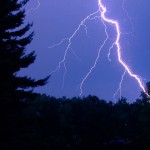
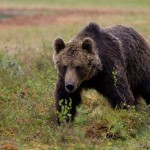
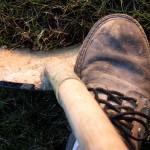
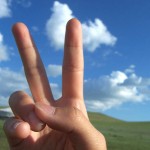
Discussion
No responses to "The Day the World Ended"
There are no comments yet, add one below.
Leave a Comment